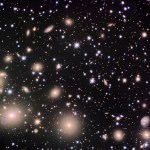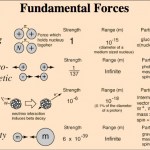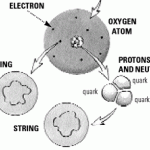String Theory
Today's guest post is by Weizmann Institute physicist, Prof. Micha Berkooz. Berkooz, a string theorist, recently organized a conference at the Institute on "Black Holes and Quantum Information Theory." We asked him about Hawking's recent proposal, reported in Nature under the headline:"There are no black holes."
Celebrated theoretical physicist Stephen Hawking has opened a can of worms in his 1976 paper on black holes. In a recent article, he is trying to put the worms back into the can. It may prove a little trickier than expected.
Black holes are solutions of Einstein's equations of…
"...this consensus has been brought about, not by shifts in philosophical preference or by the influence of astrophysical mandarins, but by the pressure of empirical data." -Steven Weinberg
One of the most fundamental questions we could ever ask about all of existence is "What makes up the Universe?"
Image credit: Misti Mountain Observatory.
I don't mean "stars and galaxies," like you see above. That might make up the Universe on the largest scales, but that's taking a look at the question of what the fundamental constituents of the Universe compose themselves into.
The other side of the…
Mining the Astronomical Literature - yes, just ADS not the Asteroids, yet.
Shamelessly cribbed from a thread on the fb Astronomers group
In defence of string theory - rather good post by Matt Strassler
Claim that founding node of networks can be efficiently localized by sparse sampling
Don't Confuse Technology With College Teaching - from the Chronicle
Kepler 11: A Six-Planet Sonata from Alex Parker on Vimeo.
"Even if there is only one possible unified theory, it is just a set of rules and equations. What is it that breathes fire into the equations and makes a universe for them to describe?" -Stephen Hawking
After a long search spanning more than my entire lifetime (so far), the Higgs boson has finally been discovered at both detectors -- CMS and ATLAS -- at the Large Hadron Collider at CERN.
Image credit: CERN / Particle Physics for Scottish Schools.
For a little more on this, check out the earlier posts here celebrating Higgs week:
The Biggest Firework of them all: The Higgs
How the…
"Give me a coin. <Takes Coin.> All right. Uh... heads, I win, tails, you lose. Right? <Flips coin.> Tails, you lose." -Ralph Kramden
All things being equal, you're well aware that if you flipped a completely fair coin, you'd have a 50% chance of it landing on heads, and a 50% chance of landing on tails (ignoring the side, of course).
Image credit: C. Nolan, A. Eckhart and Warner Bros. Pictures, retrieved from http://explow.com/Two-Face.
So let's imagine that you flip the coin ten times, and you get seven heads and three tails. Are you worried? You shouldn't be; in…
The good news: Despite their best efforts, the folks at CERN failed to produce a black hole that sucked the entire earth into it! That would have been cool. The bad news is for string theory. What might be one of the few empirical tests for that tangle of math and stuff seems to have come out negative. From CERN:
The CMS experiment at CERN's Large Hadron Collider (LHC) has completed a search for microscopic black holes produced in high-energy proton-proton collisions. No evidence for their production was found and their production has been excluded up to a black hole mass of 3.5-4.5…
Tommaso Dorigo has an interesting post spinning off a description of the Hidden Dimensions program at the World Science Festival (don't bother with the comments to Tommaso's post, though). He quotes a bit in which Brian Greene and Shamit Kachru both admitted that they don't expect to see experimental evidence of extra dimensions in their lifetime, then cites a commenter saying "Why the f*** are you working on it, then?" Tommaso offers a semi-quantitative way to determine whether some long-term project is worth the risk, which is amusing.
I was reminded of this when I looked at the Dennis…
Since I was going to be down here anyway to sign books at the World Science Festival Street Fair, Kate and I decided to catch one of the Saturday events at the Festival. It was hard to choose, but we opted for the program on Hidden Dimensions: Exploring Hyperspace (Live coverage was here, but the video is off), because it was a physics-based topic, and because I wrote a guest-blog post on the topic for them.
(No, we didn't go to the controversial "Science and Faith" panel, opting instead to have a very nice Caribbean dinner at Negril Village, just around the corner. I'll take excellent…
What: A public presentation, "Not Even Wrong: The Failure of String Theory & the Continuing Challenge to Unify the Laws of Physics"
Where: Brooklyn Society for Ethical Culture, 53 Prospect Park West (corner of Prospect Park West and 1st Street), Brooklyn, NY [map]
When:Monday, May 18, 7:30 p.m.
Cost: free and open to the public.
Peter Woit is a mathematician and physicist at Columbia University who will discuss string theory and why it is controversial, as well as prospects for new experiments and a better understanding of the mathematical theories used to describe the physical world…
What: A public presentation, "Not Even Wrong: The Failure of String Theory & the Continuing Challenge to Unify the Laws of Physics"
Where: Brooklyn Society for Ethical Culture, 53 Prospect Park West (corner of Prospect Park West and 1st Street), Brooklyn, NY [map]
When: Monday, May 18, 7:30 p.m.
Cost: free and open to the public.
Peter Woit is a mathematician and physicist at Columbia University who will discuss string theory and why it is controversial, as well as prospects for new experiments and a better understanding of the mathematical theories used to describe the physical world…
Bret Underwood, a friend of mine from my time in Madison, WI, saw my post on String Theory, and took issue with my statement that it wasn't testable. I'm still standing behind what I said, but let's address what Bret has to say.
I donât understand your argument above for why string theory is untestable. In fact, it seems to me you just outlined the best possible case for string theory! What you said above is that if I have a string theory construction of a phenomenon (say, the Standard Model or Inflation), which uses a set of parameters X, and makes some predictions, then I can find another…
Over the past few months, I have been asked a number of questions about String Theory and the Universe, including from readers Benhead and Mastery Mistery. But now Jamie, whom I'm going to marry later this year, has been asking me about it, and so it's time to write something about the scientific topic of String Theory. (Send in your questions now, because I'll answer them all this week if there's enough interest.) Let's start with this pair of questions:
String theory has been around for over 20 years, and so far, there is not one shred of experimental or observational evidence in support of…
The search for a Theory of Everything, which is kind of the unofficial M.O. of the scientific establishment, has always been closely guarded. The elements of profound uncertainty involved with such a quest have always primly clipped, safe from the grubby hands of untrained speculation. Relatively sane, brilliant physicists who err too far in the direction of the fabulous are practically shunned, or at least relegated to different class; those who posit that any variant of string theory might bridge the gap are nominally demoted from "physicists" to "string theorists," a nomenclature that…




